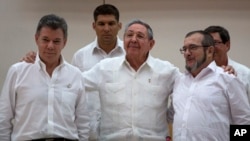Colombia's FARC rebel group would not accept opposition to a peace deal with the government from within its ranks or allow dissidents to use its name, the leadership said Friday, after one unit announced that it would not lay down its weapons.
The 200-strong Armando Rios First Front in the southeastern jungle province of Guaviare said this week it would not disarm or demobilize once an accord was reached. The announcement was the first public opposition to a peace deal from within the 7,000-member Marxist group and may prompt more dissent in the coming weeks, security sources said.
More than two weeks ago, the leaders of the Revolutionary Armed Forces of Colombia (FARC) and the government announced a cease-fire deal at their almost four-year-old talks in Cuba.
In a statement from "the mountains of Colombia," the FARC leadership said decisions within the group are made by majority, and any members choosing an "uncertain adventure" would no longer be part of the organization.
"Whomever declares themselves removed from the directorate puts themselves outside of the FARC-EP and cannot use its name, arms or properties for any purpose," the statement said.
"Peace is and will continue to be the flag of all true revolutionaries."
The First Front, which is known to have links to the drug trade, called on other units to join forces to continue fighting. A commander of the breakaway unit, Gentil Duarte, had recently been part of the rebel negotiating team.
The unit, which famously held former presidential candidate Ingrid Betancourt and three American contractors hostage, said the deals being reached at talks in Havana would not solve the social and economic problems which first motivated the FARC to take up arms in 1964.
President Juan Manuel Santos has said the peace talks, aimed at ending a conflict which has killed more than 220,000 and displaced millions, may conclude as early as this month. Any deal would be put to Colombians for approval in a public vote.
Santos said this week that any FARC unit that does not adhere to a peace agreement would continue at war and its members would be killed or imprisoned.





